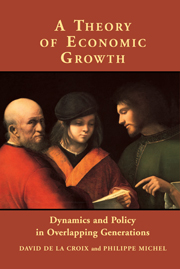A Theory of Economic Growth
Dynamics and Policy in Overlapping Generations
£110.00
- Authors:
- David de la Croix, Université Catholique de Louvain, Belgium
- Philippe Michel, Bibliothèque de l'Universitè de la Méditerranée, France
- Date Published: October 2002
- availability: Available
- format: Hardback
- isbn: 9780521806428
£
110.00
Hardback
Other available formats:
Paperback, eBook
Looking for an inspection copy?
This title is not currently available on inspection
-
Provides an in-depth treatment of the overlapping generations model in economics incorporating production. Chapter 1 investigates competitive equilibria and corresponding dynamics: existence and uniqueness of equilibrium, global dynamics of capital (including poverty traps), and various extensions of the model. Chapter 2 analyzes the optimality of allocations in this framework, using both the value function and marginal approaches. Optimality with unbounded growth is also analyzed. Policy issues including the Second Welfare Theorem, pensions, government spending, and optimal taxation, are discussed in chapter 3. The notion of public debt is introduced in chapter 4 and the sustainability of policies with budget deficits/surpluses is examined. The last chapter presents extensions of the model including altruism, education/human capital, and habit formation. Methodological emphasis is put on using general preferences and technologies, on the global study of dynamic aspects of the model, and on furnishing adequate tools to analyze policies involving inter-generational transfers.
Read more- A most rigourous analysis on the theory of economic growth using overlapping generations model
- Authors are respectively well-respected 'young Turk' and senior professor in Western European economics
- Balances theory and policy, provides explicit benchmarks on determinants of growth, intergenerational transfers
Reviews & endorsements
'A comprehensive, up-to-date primer on the dynamics of growth theory and fiscal policy, written by two recognized experts in the field. For graduate students, researchers and policy-makers, this book illustrates how to harness solid economic theory in the service of cutting-edge debates about education, social security reform, and public debt management.' Costas Azariadis, University of California, Los Angeles
See more reviews'The overlapping generations model and the infinitely lived or dynastic model are the two workhorses of modern macroeconomics. De La Croix and Michel have written a wonderfully accessible graduate textbook on the overlapping generations model. They carefully take students through essentially every variant of the model, prove a large number of known results, and offer a few new ones as well. This book is an essential addition as a teaching tool and an invaluable reference on every economist's shelf.' V. V. Chari, University of Minnesota
'In recent decades overlapping generation models have become a central framework of analysis in the research of economic growth. The authors present a comprehensive and lucid exposition of the dynamic structure of the basic overlapping generation features with production. Highly recommended for researchers and graduate students in the fields of growth theory and dynamic macroeconomics.' Oded Galor, Brown University
'Some of the most hotly debated government policies are those that involve redistribution across generations, such as social security and public education. De la Croix and Michel provide a manual of economic tools for evaluating these sorts of policies based on simple overlapping generations models. Their presentation of these models strives to combine applicability for policy analysis with a solid foundation in dynamic general equilibrium theory. Their book should be of use to economists from the level of advanced undergraduate students to researchers and teachers.' Timothy J. Kehoe, University of Minnesota and Federal Reserve Bank of Minneapolis
'David de la Croix and Philippe Michel have written the definitive what's what study of economic growth and policy in the life-cycle growth model. Their book is a treasure for serious economists, both young and old.' Laurence J. Kotlikoff, Boston University
'The overlapping generations model is a cornerstone of contemporary economic theory. De la Croix and Michel provide the first comprehensive textbook devoted to the analysis of these models. The book will be of considerable use to economists studying demographical economics, intergenerational fiscal policies, or more generally any issue related to long-run growth.' Gilles Saint-Paul, Université des Sciences Sociales de Toulouse
'… an excellent introduction to an essential tool in economics …' Journal of Economics
Customer reviews
Not yet reviewed
Be the first to review
Review was not posted due to profanity
×Product details
- Date Published: October 2002
- format: Hardback
- isbn: 9780521806428
- length: 400 pages
- dimensions: 236 x 158 x 30 mm
- weight: 0.744kg
- contains: 85 b/w illus. 10 tables
- availability: Available
Table of Contents
Introduction
Acknowledgements
Part I. Competitive Equilibria:
1. The model
2. Main assumptions
3. The behavior of the agents at period t
4. The temporary equilibrium
5. The inter-temporal equilibrium with perfect foresight
6. Capital dynamics at a rational inter-temporal equilibrium
7. Comparison of myopic and perfect foresight
8. Applications and extensions
9. Conclusion
Part II. Optimality:
10. Optimality of stationary paths
11. Optimality of the dynamics
12. The planning problem
13. Marginal analysis of optimal solutions
14. Unbounded optimal growth
15. Applications and extensions
16. Conclusion
Part III. Policy:
17. Lump-sum transfers and the second welfare theorem
18. Pensions
19. Public spending
20. Study of the second-best problem
21. Applications and extensions
22. Conclusion
Part IV. Debt:
23. Diamond's model with debt
24. The inter-temporal budget constraint of the government
25. Constant deficit policies
26. Constant debt policies
27. Applications and extensions
28. Conclusion
Part V. Further Issues:
29. Dynastic altruism
30. Human capital and education
31. Inter-generational externalities
32. Macro-economics and general equilibrium
Technical appendices
List of definitions
List of propositions
List of assumptions
Bibliography
Author index
Subject index.Instructors have used or reviewed this title for the following courses
- International Trade
Sorry, this resource is locked
Please register or sign in to request access. If you are having problems accessing these resources please email [email protected]
Register Sign in» Proceed
You are now leaving the Cambridge University Press website. Your eBook purchase and download will be completed by our partner www.ebooks.com. Please see the permission section of the www.ebooks.com catalogue page for details of the print & copy limits on our eBooks.
Continue ×Are you sure you want to delete your account?
This cannot be undone.
Thank you for your feedback which will help us improve our service.
If you requested a response, we will make sure to get back to you shortly.
×






